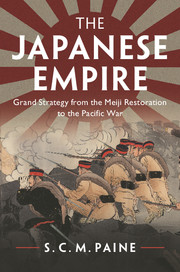Book contents
- Frontmatter
- Dedication
- Contents
- List of Maps
- Acknowledgments
- Maps
- 1 The Meiji Generation
- 2 The First Sino- Japanese War (1894– 1895)
- 3 The Russo- Japanese War (1904– 1905)
- 4 The Transition from a Maritime to a Continental Security Paradigm
- 5 The Second Sino- Japanese War (1931– 1941)
- 6 The General Asian War (1941– 1945)
- 7 Japan betwixt Maritime and Continental World Orders
- Select Bibliography
- Index
1 - The Meiji Generation
Published online by Cambridge University Press: 31 March 2017
- Frontmatter
- Dedication
- Contents
- List of Maps
- Acknowledgments
- Maps
- 1 The Meiji Generation
- 2 The First Sino- Japanese War (1894– 1895)
- 3 The Russo- Japanese War (1904– 1905)
- 4 The Transition from a Maritime to a Continental Security Paradigm
- 5 The Second Sino- Japanese War (1931– 1941)
- 6 The General Asian War (1941– 1945)
- 7 Japan betwixt Maritime and Continental World Orders
- Select Bibliography
- Index
Summary
The average Westerner … was wont to regard Japan as barbarous while she indulged in the gentle arts of peace: he calls her civilised since she began to commit wholesale slaughter on Manchurian battlefield.
Okakura Kakuzō (1862–1913), philosopher, art critic, in reference to the Russo-Japanese WarThe Book of Tea (1906)During two periods in the last century and a half, Japan has been governed by extraordinary generations of leaders, whose choices brought their citizens prosperity and their country the accolades of the world. They were the Meiji generation, which transformed Japan in the late nineteenth century into the first modern, non-Western great power, and the post-World War II generation, which transformed Japan after the disastrous Second Sino-Japanese War (1931–45) into an economic powerhouse soon emulated by all of its neighbors. These two generations bookend the narrative told here of a meteoric rise ending in a shattering fall encompassing all of Asia and destroying imperial Japan. It is a story beginning with brilliance and ending in tragedy.
Few nations have solved the conundrum of economic development. Yet the Japanese in the late nineteenth century became experts at economic development and their story has much to offer others concerning both the prerequisites and the pitfalls of transforming a traditional society into a modern country. Japanese leaders modernized and westernized their homeland in order to defend against the predations of increasingly intrusive Western powers. From 1894 to 1945, they fought a series of three wars to contain the march of Russian imperialism into Asia that became the march of Communist imperialism post-1917. While their strategy delivered rapid economic development and victory in the first two conflicts, the third war escalated into a global war that destroyed imperial Japan and produced mayhem on a scale unprecedented for humankind. Although the goal to become and remain a great power had not changed, the conflicts produced antithetical outcomes. The question is, why?
Traditionally, governments have wielded power through the creation of large armies to dominate citizens and neighbors, but since the Industrial Revolution, this approach has yielded low standards of living and often only fleeting military triumphs.
- Type
- Chapter
- Information
- The Japanese EmpireGrand Strategy from the Meiji Restoration to the Pacific War, pp. 1 - 14Publisher: Cambridge University PressPrint publication year: 2017



